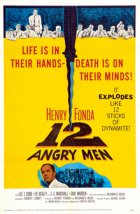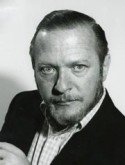
12 Angry Men
CHARACTERS:
FOREMAN:
A small, petty man who is impressed with the authority he has and handles himself quiteformally. Not overly bright, but dogged.
JUROR NO. 2:
A meek, hesitant man who finds it difficult to maintain any opinions of his own. Easily swayedand usually adopts the opinion of the last person to whom he has spoken.
JUROR NO. 3:
A very strong, very forceful, extremely opinionated man within whom can be detected a streakof sadism. He is a humorless man who is intolerant of opinions other than his own and accustomed to forcing
his wishes and views upon others.
JUROR NO. 4:
Seems to be a man of wealth and position. He is a practiced speaker who presents himself wellat all times. He seems to feel a little bit above the rest of the jurors. His only concern is with the facts in this
case, and he is appalled at the behavior of the others.
JUROR NO. 5:
A naive, very frightened young man who takes his obligations in this case very seriously but,who finds it difficult to speak up when his elders have the floor.
JUROR NO. 6:
An honest but dull-witted man who comes upon his decisions slowly and carefully. A man whofinds it difficult to create positive opinions, but who must listen to and digest and accept those opinions offered
by others which appeal to him most.
JUROR NO. 7:
A loud, flashy-handed salesman type who has more important things to do than to sit on a jury.He is quick to show temper, quick to form opinions on things about which he knows nothing. Is a bully and, of
course, a coward.
JUROR NO. 8:
A quiet, thoughtful, gentle man. A man who sees all sides of every question and constantlyseeks the truth. A man of strength tempered with compassion. Above all, he is a man who wants justice to be
done and will fight to see that it is.
JUROR NO. 9:
A mild gentle old man long since defeated by life and now merely waiting to die. A man whorecognizes himself for what he is and mourns the days when it would have been possible to be courageous
without shielding himself behind his many years.
JUROR NO. 10 An angry, bitter man. He is man who antagonizes almost at sight. A bigot who places no
values on any human life save his own, a man who has been nowhere and is going nowhere and knows it deep
within him.
JUROR NO. 11:
A refugee from Europe who has come to this country in 1941. A man who speaks with anaccent and who is ashamed humble, almost subservient to the people around him, but who will honestly seek
justice because he has suffered through so much injustice.
Juror NO. 12:
A slick, bright advertising man who thinks of human beings in terms of percentages graphs, andpolls and has no real understanding of people. He is a superficial snob, but trying to be a good fellow.
NO. 12:
A slick, bright advertising man who thinks of human beings in terms of percentages graphs, andpolls and has no real understanding of people. He is a superficial snob, but trying to be a good fellow.
ACT 1
Fade in on a jury box. Twelve men are seated in it, listening intently to the voice of the judge as he charges
them. We do not see the judge. He speaks in slow, measured tones, and his voice is grave. The camera drifts
over the faces of the jurymen as the judge speaks, and we see that most of their heads are turned to camera's
left. NO. 7 looks down at his hands. NO. 3 looks off in another direction, the direction in which the defendant
would be sitting. NO. 10 keeps moving his head back and forth nervously. The judge drones on.
JUDGE:
Murder in the first degree—premeditated homicide—is the most serious charge tried in our criminalcourts. You've heard a long and complex case, gentlemen, and it is now your duty to sit down to try and
separate the facts from the fancy. One man is dead. The life of another is at stake. If there is a reasonable doubt
in your minds as to the guilt of the accused . . . then you must declare him not guilty. If, however, there is no
reasonable doubt, then he must be found guilty. Whichever way you decide, the verdict must be unanimous. I
urge you to deliberate honestly and thoughtfully. You are faced with a grave responsibility. Thank you,
gentlemen.
[There is a long pause.]
CLERK:
(droning). The jury will retire.[And now, slowly, almost hesitantly, the members of the jury begin to rise. Awkwardly, they file out of the jury
box and off camera to the left. Camera holds on jury box, and then fades out].
[Fade in on a large bare, unpleasant-looking room. This is the jury room in the county criminal court of a large
Eastern city. It is about 4:00 P.M. The room is furnished with a long conference table and a dozen chairs. The
walls are bare, drab and badly in need of a fresh coat of paint. Along one wall is a row of windows, which look
out on the skyline of the city's financial district. High on another wall is an electric clock. A washroom opens off
the jury room. In one corner of the room is a water fountain. On the table are pads, pencils, and ashtrays. One
of the windows is open. Papers blow across the table and onto the floor as the door opens. Lettered on the
outside of the door are the words "Jury Room". A uniformed guard holds the door open. Slowly, almost self-
consciously, the twelve jurors file in. The guard counts them as they enter the door, his lips moving, but no
sound coming forth. Four or five of the jurors light cigarettes as they enter the room. Juror NO. 5 lights his
pipe, which he smokes constantly throughout the play. Jurors NO. 2 and 12 go to the water fountain. NO. 9
goes into the washroom, the door of which is lettered "Men." Several of the jurors take seats at the table. Others
stand awkwardly around the room. Several look out the windows. These are men who are ill at ease, who do not
really know each other to talk to and who wish they were anywhere but here. NO. 7, standing at window, takes
out a pack of gum, takes a piece, and offers it around. There are no takers. He mops his brow.]
NO. 7:
(to NO. 6). Y' know something? It's hot. (NO. 6 nods.) You'd think they'd at least air condition the place.I almost dropped dead in court.
[NO. 7 opens the window a bit wider. The guard looks them over and checks his count. Then, satisfied, he
makes ready to leave.]
GUARD:
Okay, gentlemen. Everybody's here. If there's anything you want, I'm right outside. Just knock.[He exits, closing the door. Silently they all look at the door. We hear the lock clicking.]
NO. 5:
I never knew they locked the door.NO. 10:
(blowing nose). Sure, they lock the door. What did you think?NO. 5:
I don't know. It just never occurred to me.[Some of the jurors are taking off their jackets. Others are sitting down at the table. They still are reluctant to
talk to each other. FOREMAN is at head of table, tearing slips of paper for ballots. Now we get a close shot of
NO. 8:
He looks out the window. We hear NO. 3 talking to NO. 2]NO. 3:
Six days. They should have finished it in two. Talk, talk, talk. Did you ever hear so much talk aboutnothing?
Translation
Translate and read this script in other languages:
Select another language:
- - Select -
- 简体中文 (Chinese - Simplified)
- 繁體中文 (Chinese - Traditional)
- Español (Spanish)
- Esperanto (Esperanto)
- 日本語 (Japanese)
- Português (Portuguese)
- Deutsch (German)
- العربية (Arabic)
- Français (French)
- Русский (Russian)
- ಕನ್ನಡ (Kannada)
- 한국어 (Korean)
- עברית (Hebrew)
- Gaeilge (Irish)
- Українська (Ukrainian)
- اردو (Urdu)
- Magyar (Hungarian)
- मानक हिन्दी (Hindi)
- Indonesia (Indonesian)
- Italiano (Italian)
- தமிழ் (Tamil)
- Türkçe (Turkish)
- తెలుగు (Telugu)
- ภาษาไทย (Thai)
- Tiếng Việt (Vietnamese)
- Čeština (Czech)
- Polski (Polish)
- Bahasa Indonesia (Indonesian)
- Românește (Romanian)
- Nederlands (Dutch)
- Ελληνικά (Greek)
- Latinum (Latin)
- Svenska (Swedish)
- Dansk (Danish)
- Suomi (Finnish)
- فارسی (Persian)
- ייִדיש (Yiddish)
- հայերեն (Armenian)
- Norsk (Norwegian)
- English (English)
Citation
Use the citation below to add this screenplay to your bibliography:
Style:MLAChicagoAPA
"12 Angry Men" Scripts.com. STANDS4 LLC, 2025. Web. 22 Feb. 2025. <https://www.scripts.com/script/12_angry_men_58>.







Discuss this script with the community:
Report Comment
We're doing our best to make sure our content is useful, accurate and safe.
If by any chance you spot an inappropriate comment while navigating through our website please use this form to let us know, and we'll take care of it shortly.
Attachment
You need to be logged in to favorite.
Log In